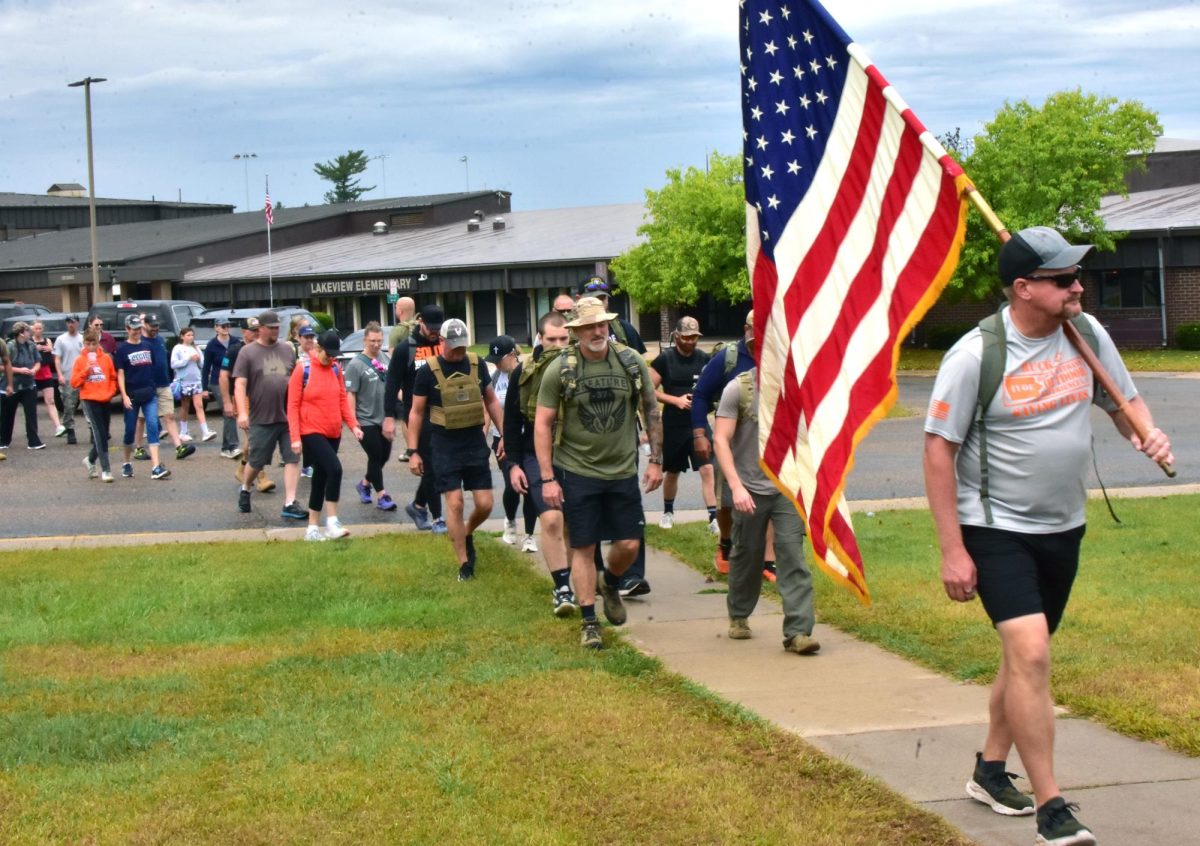Even with spotty rain showers and the threat of more, 47 participants (many with 22 pounds on their back in a rucksack) in the third annual RUCK 22 marched a 2.2-mile track through Solon Saturday, Sept. 20. They marched for comrades lost to the demons haunting them. They marched in support of those struggling. They marched in the hopes no more veterans will return from war but lose the war in their mind.
For organizer Doug “Doc” Thompson, Chaplain for American Legion Stinocher Post 460 and a Vietnam Fleet Marine Force Corpsman (combat medic), the march, starting at Lakeview Elementary and ending at the Legion’s ball field and the Global War on Terror Wall of Remembrance, is personal. Thompson started the ruck after initially thinking about soliciting pledges for marching 22 miles (in recognition of the 22 veterans per day (estimated) lost to suicide.
The idea evolved to the ruck, at a distance and comfortable pace for many.
The 22 theme carried over to the registration fee, commemorative T-shirts, 2.2-mile distance, and 22 pounds of weight carried by many.
The ruck not only drew attention to veteran suicide but served as a fundraiser for Iowa Veterans Outdoor Experience (IVOE), an all-volunteer veterans advocacy group based in Solon, who provides support and recreational and healing opportunities for veterans.
As a light drizzle fell, Thompson expressed his gratitude.
“I’m just grateful that people were still willing to come out and support us. I’m overwhelmed that people I don’t even know would show up (from beyond Solon and the surrounding area).”
Ways to help a veteran in crisis
While there are suicide and crisis hotlines such as 988 or locally Foundation II in Cedar Rapids (319-362-2174), there is a dedicated line for veterans – the Veterans Crisis Line at 1-800-273-8255 (press 1), text 838255, or chat online at www.veteranscrisisline.net.
For those close to a troubled vet, it can be challenging trying to find a way to help them, and if the veteran commits suicide, feelings of inadequacy and guilt often result.
“I’ve had a vet standing here and they’re feeling low because they felt like they should’ve been able to do something, should’ve done something, and now they feel like they failed that person. The only question I would ask them is, if the role was reversed, what kind of life would you want your friend to have? I’ll bet you nine times out of ten, it’s ‘to be happy, successful, have a good family, and be part of the community.’ If that is what you would want for that person then you should do the same thing,” Thompson said. “Their deceased friends would never want them to beat themselves up. If you really want to honor that person, live a good life and be an integral part of your community.”
Thompson said he would encourage a veteran who is struggling to get help, either through the VA system or an outside mental health provider while acknowledging the stigma associated with admitting there is a problem and seeking that help.
“There is no shame in that. (Some) people see it as a weakness but it’s not. It takes more courage to stand up and go to a therapist and say, ‘I need help.’ It takes a lot of courage to do that. And just stand by them, encourage them, ‘You’ll be OK, you’ll have those little fractures for the rest of your life but those fractures do not define who you are.’ You just live your life fully, completely, and that’s what you’ve got to do for that person.”
The ongoing mission
For Thompson, organizing the ruck has gotten easier, even if the physicality hasn’t.
“I think it’s gotten easier from the standpoint I look forward to doing this, personally. Physically, I’m 76 years old and I twisted my ankle a few years back, and my ankle acts up on me every once in a while, that makes it hard to walk; but I’m going to keep walking as long as I can walk. And if I get to the point I can’t walk, I’ll crawl then, because this is important to me.”

